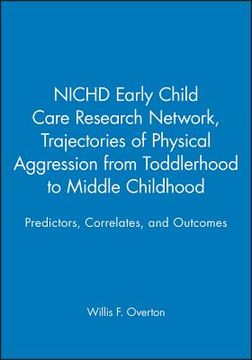Share
nichd early child care research network, trajectories of physical aggression from toddlerhood to middle childhood: predictors, correlates, and outcomes (in English)
Willis F. Overton
(Illustrated by)
·
William F. Arsenio
(Commentaries by)
·
Wiley-Blackwell
· Paperback
nichd early child care research network, trajectories of physical aggression from toddlerhood to middle childhood: predictors, correlates, and outcomes (in English) - Overton, Willis F. ; Arsenio, William F.
$ 59.37
$ 74.21
You save: $ 14.84
Choose the list to add your product or create one New List
✓ Product added successfully to the Wishlist.
Go to My WishlistsIt will be shipped from our warehouse between
Tuesday, June 11 and
Wednesday, June 12.
You will receive it anywhere in United States between 1 and 3 business days after shipment.
Synopsis "nichd early child care research network, trajectories of physical aggression from toddlerhood to middle childhood: predictors, correlates, and outcomes (in English)"
this monograph addresses three questions: a) can distinct trajectories of physical aggression be identified in children from 24 months to third grade? b) do child and family characteristics and child care experiences predict membership in the trajectory groups? c) do trajectory groups differ in their levels of academic and social functioning in third grade? using a person-centered approach and data from the nichd study of early child care and youth development, five aggression trajectories were identified: very low, low, moderate-steeply declining, moderate-stable, and high-stable. higher levels of family resources and more sensitive parenting predicted low levels of aggression. higher sociodemographic risk and less involved parenting predicted higher aggression. child care experiences were not related systematically to aggression trajectories. in third grade, children on the higher and more stable aggression trajectories were performing more poorly socially and academically. however, aggression that was evident only in the preschool period was not associated with problematic functioning. children on the two higher aggression trajectories also differed from one another in the type and severity of their problems in third grade.

